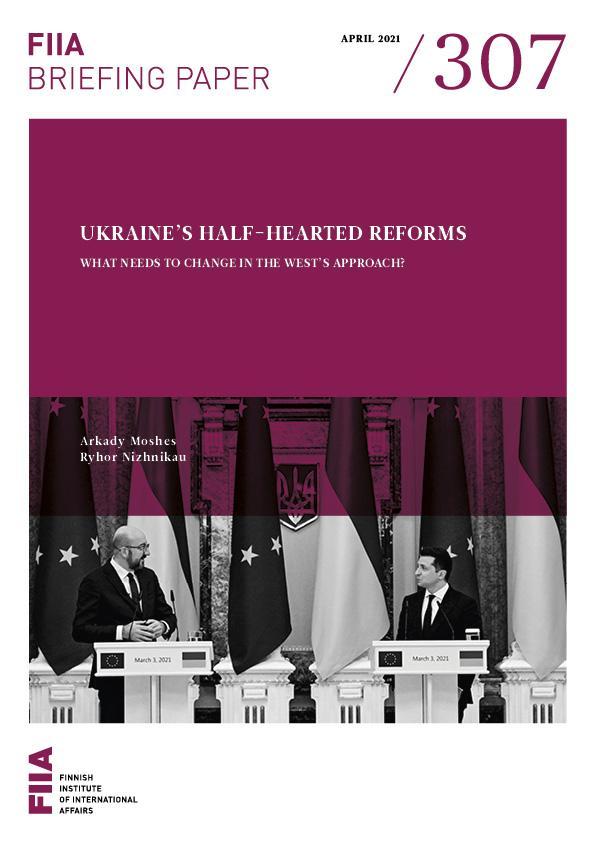Comprehensive internal reforms, along with security cooperation, are a key pillar of West-Ukraine interaction. Thus far, however, the Western effort has not sufficed to overcome the resistance of the local elites and make the reforms irreversible.
High hopes raised by Volodymyr Zelensky’s election as Ukraine’s president in 2019 were short-lived. In three priority areas – anti-corruption, the judiciary and the economy – reforms have stalled. Instead, Zelensky has started to adapt the same socio-political system that the West aims to transform to his own political purposes.
Western support – or even leadership – is once again becoming crucial in keeping Ukraine on the reform track. Ongoing domestic developments seriously challenge Zelensky’s administration, creating a window of opportunity for a more successful application of reform conditionality. In turn, a new US administration may be much more capable of using this emerging opportunity than its predecessor.
If they are to promote reforms more efficiently, Western actors should go beyond the technocratic approach and recognize their own “ownership” of the process. Progress with reforms requires direct and high-level political engagement to enforce the implementation of agreements and to empower pro-reform forces inside the country.
Introduction
Since Ukraine became independent in 1991, the West has been facing a transformative conundrum in the country. Despite two popular revolutions that won on a Euro-Atlantic integration platform, significant Western assistance and investment, the growing institutionalization of relations, and the increasing dependence of Ukraine on the support of the West, the latter has not been able to advance its transformative goals in Ukraine beyond the point of no return.
The election of Volodymyr Zelensky in May 2019 appeared to be a fresh start. Ukraine’s sixth president pledged to “break the system”, clean up the corrupt elite, defeat the oligarchy, and modernize the state. Hopes of a new era in Ukrainian politics were reinforced after the pro-presidential party, “Servant of the People” (Sluha Narodu), obtained an absolute majority in the parliamentary election in August 2019, and duly established control over the Verkhovna Rada and the government.
The West embraced the replacement of personalities in power in Ukraine rather uncritically. It took Zelensky’s pro-change rhetoric at face value despite his populist overtones and lack of experience, the absence of a clear action plan, and his dubious ties to various oligarchic groups. The reality, however, turned out to be much less encouraging. Interest groups effectively blocked the announced changes. Furthermore, an argument emerged within Zelensky’s team that cooperation with the West was not a necessity.[1]
By spring 2021, the West signaled its dissatisfaction with the internal developments in Ukraine quite unequivocally. In fall 2020 and winter 2021, the International Monetary Fund (IMF) refused to disburse two tranches to Ukraine from the previously agreed standby program, to the tune of 700 million USD each, since Ukraine had failed to honor its commitments. The new US president Joe Biden postponed a phone call with Zelensky until April, which was universally interpreted by observers as an expression of discontent with Zelensky’s poor reform record. Meanwhile, the new Washington administration has imposed sanctions on Ukrainian tycoon Igor Kolomoisky, whose media empire was instrumental in Zelensky’s election. In turn, in February 2021, the European Parliament adopted a resolution on the implementation of the EU Association Agreement with Ukraine, which strongly criticized the Ukrainian government for hampering reforms in key areas, its lack of political will, and its failure in terms of de-oligarchization.[2]
As Zelensky approaches the midpoint of his term in office, the time is ripe to re-assess the premises of Ukraine-West relations in the context of reforms. Moreover, in 2022 it will be five years since the EU-Ukraine Association Agreement, a principal instrument of Ukraine transformation, entered into force, which is another reason for reflection in this regard. This Briefing Paper puts the Western policy of reform promotion in Ukraine into the country’s evolving domestic context and discusses how its efficiency can be enhanced. It will be argued that the stagnation of both the peace process in Donbas and the institutional reforms is weakening Zelensky’s political position and duly creating a window of opportunity – albeit modest in size – for the West to push the reforms forward. Success, however, will depend on the West’s ability to increase its political – as opposed to technocratic – commitment and assume “ownership” of the process.
Reform-maker or reform-faker?
The election of Volodymyr Zelensky renewed hopes of unblocking the reforms that had been procrastinated under the previous president, Petro Poroshenko. Zelensky’s image of a political newcomer, belonging to a post-Soviet generation, positively distinguished him from his predecessors, who were systemic representatives of the old elite. His narrative of changing the ‘system’, building strong state institutions, and deepening Euro-Atlantic integration reinforced this positive impression.
Although Zelensky’s political agenda understandably aimed above all at bringing peace to Eastern Ukraine, his early reform steps won him credit in the West. Symbolically, Zelensky made his first official visit to EU and NATO institutions in Brussels. The new government affirmed its commitment to further implementation of the Association Agreement and the Deep and Comprehensive Free Trade Area (DCFTA). Reputable reformers were put in charge of key law enforcement and economic agencies. In fall 2019, control over the legislature made it possible to pass several long-delayed reformist economic, political and security laws, such as the law on the land market and the labor code. Following Western demands, the High Anti-Corruption Court (HACC) began its work and issued its first verdicts, while the National Agency on Corruption Prevention (NACP) – a key element in the national anti-corruption infrastructure – was re-launched. Cooperation with international financial institutions and the EU intensified. In June 2020, after the parliament approved the so-called “anti-Kolomoisky law” forbidding the return of nationalized banks to former owners, the IMF granted Ukraine a new loan of 5 billion USD.
Yet it was not long before Ukraine returned to the path of reform imitation. Key reforms lapsed in the three areas identified as key priorities by the EU, US and IMF. First, anti-corruption reforms were suspended. The Office of the President, explicitly or implicitly, by means of new legislative initiatives, started to interfere in the functioning of the anti-corruption agencies. The integrity of the Special Anti-Corruption Prosecutor’s Office (SAPO) is undermined by a widely criticized selection process for the new head (the selection commission does not meet legal criteria to select candidates for the position),[3] whereas the General Prosecutor’s Office (GPO) intervenes in its work. Equally, the independence of the National Anti-Corruption Bureau (NABU) and the HACC are continuously threatened. In recent months, the government has encroached on the NABU’s jurisdiction and has been trying to re-direct its focus from top-level to petty corruption.[4] Moreover, the executive branch is seeking powers to dismiss the head of the NABU, which would seriously undermine the independence of the office and jeopardize one of the pillars of Ukraine-West cooperation. The reform of the General Prosecutor’s Office, originally promising to become a success story thanks to the resolve of Zelensky’s first General Prosecutor Ruslan Riaboshapka and his team to remove superfluous functions and rid the structure of the old inefficient and/or corrupt cadres, was reversed. Riaboshapka himself was removed from office in March 2020. Consequently, nearly 70% of prosecutors passed the integrity checks and re-attestation during 2020.[5] The previously fired prosecutors were able to appeal the decisions and return to their jobs. The law on asset declaration was amended to reduce the punishment for the provision of false information.
Second, the judicial reform is in effect paralyzed. Although President Zelensky committed himself many times to a complete overhaul of the judiciary and stated that the main problems in the system were the shortage of judges, the corruption and the red tape, he does not seem to have a proper blueprint, but rather simplistically talks about the “court in a smartphone” (digitalization of the legal procedures) and employing 2,000 new judges. At the same time, the government overlooks systemic problems and ignores the recommendations of the Venice Commission[6] and the civil society on how to address them. The presidential draft law N 3711, adopted in February 2021, keeps the power to appoint and dismiss judges in the hands of the presumably corrupt and highly inefficient Supreme Council of Justice. The HACC’s monopoly on prosecuting top officials is being challenged.
Third, while the presidential economic focus is shifting towards large infrastructure projects, progress in economic reforms has been halted at best. The Ukrainian government has arguably undermined the independence of the National Bank[7] and backtracked on the energy reform. The government decision to limit gas prices for the population, taken in January 2021, directly contradicted the IMF requirements. The reform of state-owned enterprises and the process of unbundling in the electricity market has stagnated. The de-oligarchization process has not started, as illustrated by the continuing rise in their wealth: in 2020 the fortune of Ukraine’s richest man Rinat Ahmetov grew from 2.8 to 7.6 billion USD and Igor Kolomoisky’s assets nearly doubled to USD 1.8 billion.[8]
The weaknesses of the Western technocratic approach
Along with the Ukrainian civil society, which supports the country’s Euro-Atlantic integration, the West is the key driver of reforms in Ukraine, and its interest in the country’s successful transformation is beyond doubt. Yet the West consistently struggles to effectively advance its goals.
Arguably, one crucial reason for this is the reliance on primarily technocratic instruments. Together with domestic pro-reform forces, the West identifies problems, and designs and offers sophisticated solutions, such as the DCFTA. The Association Agreement not only declares allegiance to common values and promises deeper political and economic ties, but also presents a concrete action plan of comprehensive reforms in Ukraine. These goals and plans are backed up by respective packages of economic, financial and expert assistance as well as consultative missions, such as the European Union Advisory Mission and Support Group for Ukraine. The local elites are offered various benefits and joint ownership to uphold their commitments.
Unfortunately, this technocratic approach does not work as it is supposed to, following the example of the Eastern European countries that joined the EU during its enlargement. The approach implies a commitment by local elites, who are viewed as needing financial and capacity-building assistance in order to achieve progress in reforms. But in Ukraine, this commitment is insufficient, which is partly the result of the lacking EU membership perspective, but which largely stems from other, more selfish reasons. The dependence on local elites in the reform process and the prioritization of the capacity-building of state institutions, which ignores the fact that they are captured by vested interests, facilitates the manipulation of institutions by the ruling circles. As a result, the Western focus on changing formal rules is proving to be ineffective in removing the patrimonial system and overcoming the resistance of major interest groups.
On an operational level, the technocratic approach, based on the expectation of the voluntary commitment of local elites, has two major weaknesses. One is that, as experience shows, it does not allow conditionality to be applied when needed as the decision can simply not be taken at a technocratic level. Thus, there is usually no credible sanction for the inability or unwillingness of local agents to deliver, which allows them to extract benefits without fulfilling their part of the deal. A geostrategic argument that “Ukraine is too important to fail” is deployed to render Western technocrats powerless and to perpetuate the circular movement of promise and non-delivery. Second, Western technocrats do not usually possess the political clout to empower, or sometimes even to protect, their best allies – the pro-change domestic actors in the government and civil society – when they clash with the old bureaucracy. Again, when the potential sanctioning of certain officials and oligarchs could increase the costs of malign behavior, the technocratic approach demonstrates its limits and does not allow for adequate reactions.
Meanwhile, in several cases in the past, it was precisely the departure from the technocratic approach, taking the issue to the highest political level and thus raising the stakes, that enabled the West to successfully pursue its cause. The dismissal of the notorious General Prosecutor Viktor Shokin in 2015, the creation of the independent NABU, financial stabilization, and the banking system clean-up after Euromaidan all resulted from high-level and persistent political interventions by Western leaders. In this regard, the way forward may lie not only in coupling technocratic and political levels in the Western policy, but in giving the latter prominence over the former.
2021: A new domestic context
A change of tack in the Western approach may be timely and appropriate because, arguably, a window of opportunity is opening in Ukraine. Amid the atmosphere of the COVID-19 pandemic, which coincided with the change of government, conflicts within the elite and rising security concerns over Russia’s actions, Zelensky’s political position has seriously weakened, pushing him towards increasing engagement with the West which, in turn, should facilitate the adoption of a conditionality policy.
First, Zelensky’s plan to arrive at a mutual understanding with the Kremlin and achieve peaceful resolution of the conflict in Donbas did not succeed. Zelensky expended significant effort in arranging a meeting with Vladimir Putin in December 2019, but no breakthrough was achieved. The ceasefire, agreed in summer 2020, was regularly violated and ceased to be observed in practice in January 2021. Moscow no longer treats Zelensky any differently from his predecessor, Petro Poroshenko. The sanctions imposed by the Ukrainian authorities on Russia’s long-time partner oligarch Victor Medvedchuk in February 2021 may trigger a new round of escalation in Eastern Ukraine.
Second, the economic situation in Ukraine is worsening. COVID-19 had a profound effect on the economy, while corruption, the predatory behavior of oligarchs, bad economic governance and populist measures aggravated the state of affairs further. In 2020, the country’s GDP fell by 5%, which is particularly acute due to impending and significant external debt repayments. The official unemployment figure has reached 10%. Only 28% of Ukrainians considered their economic situation to be good or relatively good in February 2021, and only 7% believed that it would improve. [9]
Third, Zelensky failed to foster a core electoral support group, based on ideology, geopolitical orientation or regional belonging. His electoral popularity was the result of a temporary convergence between the electoral preferences of two distinct societal groups. Different people read his program in diametrically opposing ways. The anti-Maidan voters anticipated peace in the east and the normalization of relations with Russia. The pro-Maidan voters expected faster political and economic reforms and European integration. Neither was achieved. The patriotic-minded society is now increasingly alarmist when it comes to Zelensky on account of what it considers to be an attempt to cut a deal with Moscow, and/or neglect of Ukrainian culture and identity. It deplores the return to government of officials who served under President Viktor Yanukovych and the prosecution of right-wing activists, and expresses major concern over the extent of Russian influence at the highest echelons of power.
As a result of all these developments, Zelensky’s support plummeted. Sluha Narodu won only 15% of all members of local councils and failed to win a single major mayoral seat in the local elections in October 2020. The Razumkov Center poll in December 2020 found that 42% of Ukrainians considered Zelensky “the biggest disappointment” of the year. In February 2021, his electoral rating reached an all-time low of 22%, according to the Kyiv International Institute of Sociology. The majority of voters do not support Zelensky’s re-election and do not trust him. Sluha Narodu’s rating fell even more sharply; in February 2021, the party was fourth in the electoral preferences of voters, although its popularity slightly rebounded in March.
Sluha Narodu de facto lost its majority in parliament. Although it still formally registers 246 deputies in its parliamentary faction (226 are needed for a majority), the ruling party cannot gather the necessary votes for key laws. Despite President Zelensky’s open lobbying, Verkhovna Rada failed three times to appoint Yury Vitrenko deputy prime minister and minister of energy. The rift with oligarch Igor Kolomoisky, who informally controls a group of Sluha Narodu deputies, forces the leadership of the faction to look for alternatives that would include not just ad hoc voting coalitions in all directions to pass particular pieces of legislation, but possibly to conclude a more formal coalition with smaller parties of the national-democratic part of the spectrum.
In other words, Zelensky can no longer rely on the middle course between pro-Maidan and anti-Maidan voters. Indeed, at the beginning of 2021 there were indications of a sharp policy change. Both President Zelensky and other senior members of the administration increasingly shifted to the national-patriotic rhetoric, backed up by sanctions against pro-Russian politicians like Viktor Medvedchuk and several others, the banning of their TV channels, and the launch of new criminal cases against Igor Kolomoisky’s associates. It is exactly in this context that the intensified cooperation with the West can become an attractive policy instrument for Zelensky in regaining his popularity, and the West should be prepared to issue its reciprocal demands.
The way forward
The Ukrainian reform process in general – including the last two years – has been rather frustrating, characterized by disillusionment and disappointment among Ukraine’s friends in the West. There are two major points that need to be fully understood. Firstly, the failure of reforms in Ukraine would be a very bad outcome for the West. Should that happen, the West would have to maintain an economically inefficient and politically unstable partner out of geostrategic considerations, which would require more and more resources but might still turn out to be unsustainable in the end. In this regard, leaving Ukraine’s reform to its own devices is not an option. But, secondly, it should be equally clear that Ukrainian elites very rarely fulfil their commitments in full and only under the pressure of critical conditions or a credible political leverage. This means that the West must take conditionality in its Ukraine policy much more seriously than before. The course based on the expectations of voluntary compliance with a reform blueprint, as of 2021, should be discontinued as unrealistic.
However, Kyiv should also realize that the West may run out of goodwill, or even patience, at some point. After all, the West cannot be more interested in the future of Ukraine than Ukraine is itself. As regards the EU, the forthcoming departure of German Chancellor Angela Merkel is already causing uncertainty. A co-architect of the Minsk agreements, Merkel has invested her diplomatic reputation and, to some extent, her historical legacy in Ukraine’s economic and security success. Merkel’s successor might be free of such considerations and choose instead to return to the premises of Realpolitik in relations with Russia, as happened in the case of French President Emmanuel Macron, who came forward with a grand idea to create a new European security order, which implies re-launching the EU-Russia “constructive” dialogue. Statements that the situation in Ukraine has too strong a bearing on Russia-Europe relations surface periodically in the European discussion,[10] which does not augur well for Ukraine. When it comes to the US, although Ukraine still enjoys bipartisan support, the inability to read the signals of the Biden administration, which, as mentioned above, imposed sanctions on Igor Kolomoisky as well as several members of Sluha Narodu, may at some point sever the bilateral cooperation.
As shown in this paper, the Ukrainian leadership might be interested in reverting to the reformist agenda again. Although it may do so out of domestic political necessity rather than the genuine will to promote reforms, this nevertheless opens a window of opportunity for the West, whose role in keeping Ukraine on the reform track remains crucial. What the West needs to do is go beyond the technocratic approach and recognize its political “ownership” of the process. The personal involvement of high-level Western politicians in the elaboration and implementation of the conditionality policy vis-à-vis Ukraine can make a difference at this stage. The new US administration seems to be much more capable than its predecessor of using the emerging opportunity, but EU leaders can undoubtedly play a part as well.
Endnotes
[1] For instance, the head of the Sluha Narodu parliamentary faction, David Arahamia, spoke against legal approximation with the EU in January 2020, and against conditions of cooperation with the IMF in June 2020. Ukraїni slid timchasovo vidmovitisia vid harmonizacii zakonodavstva iz ES – Arahamiia, Ukrinform, 22 January 2020, https://www.ukrinform.ua/rubric-polytics/2861110-ukraini-slid-timcasovo-vidmovitisa-vid-garmonizacii-zakonodavstva-iz-es-arahamia.html; Programі spivpraci ta kolі Ukraіna otrіmaє transh vid MVF?, Ukraina24, 3 June 2020, https://www.youtube.com/watch?v=ES2qZ36v6u4.
[2] See European Parliament resolution of 11 February 2021 on the implementation of the EU Association Agreement with Ukraine, https://www.europarl.europa.eu/doceo/document/TA-9-2021-0050_EN.html.
[3] See Oleksandr Lemenov, ’Hlava SAP budet novyi, no riski ne umenshilis’, Zerkalo Nedeli, https://zn.ua/internal/hlava-sap-budet-novyj-no-riski-ne-umenshilis-.html.
[4] For instance, the Pechersky district court took the case against deputy head of the presidential administration, Oleh Tatarov, away from the NABU despite a negative ruling from the Constitutional Court.
[5] V Ukraіni atjestaciі nіe proіshlі blіzko 2 tісіach prokuroriv, Slovo I Dilo, 22 January 2021, https://www.slovoidilo.ua/2021/01/22/novyna/suspilstvo/ukrayini-atestacziyu-ne-projshly-2-tysyach-prokuroriv.
[6] The European Commission for Democracy through Law, commonly known as the Venice Commission, is an advisory body of the Council of Europe. It offers expertise on legal and constitutional matters and advises, among other things, on democratic institutions, fundamental rights, elections and constitutional justice.
[7] See Ukraine: Statement by the Spokesperson on the National Bank of Ukraine, EEAS, 2 July 2020, https://eeas.europa.eu/headquarters/headquarters-homepage/81951/ukraine-statement-spokesperson-national-bank-ukraine_en.
[8] Forbes onoviv reiting miliarderiv, Forbes Ukraine, 12 March 2021, https://forbes.ua/ru/news/forbes-onoviv-reyting-milyarderiv-ukraini-12032021-1153.
[9] Ocinka situacii v kraini, Razumkov Centre, 8 February 2021, https://razumkov.org.ua/napriamky/sotsiologichni-doslidzhennia/otsinka-sytuatsii-v-kraini-dovira-do-politykiv-elektoralni-oriientatsii-gromadian-sichen-liutyi-2021r.
[10] For example, see Alberto Nardelli, EU Officials Plot Lighter Touch on Russia But It’s a Tough Sell, Bloomberg, 13 March 2021, https://www.bloomberg.com/news/articles/2021-03-13/eu-officials-plot-lighter-touch-on-russia-but-it-s-a-tough-sell.





